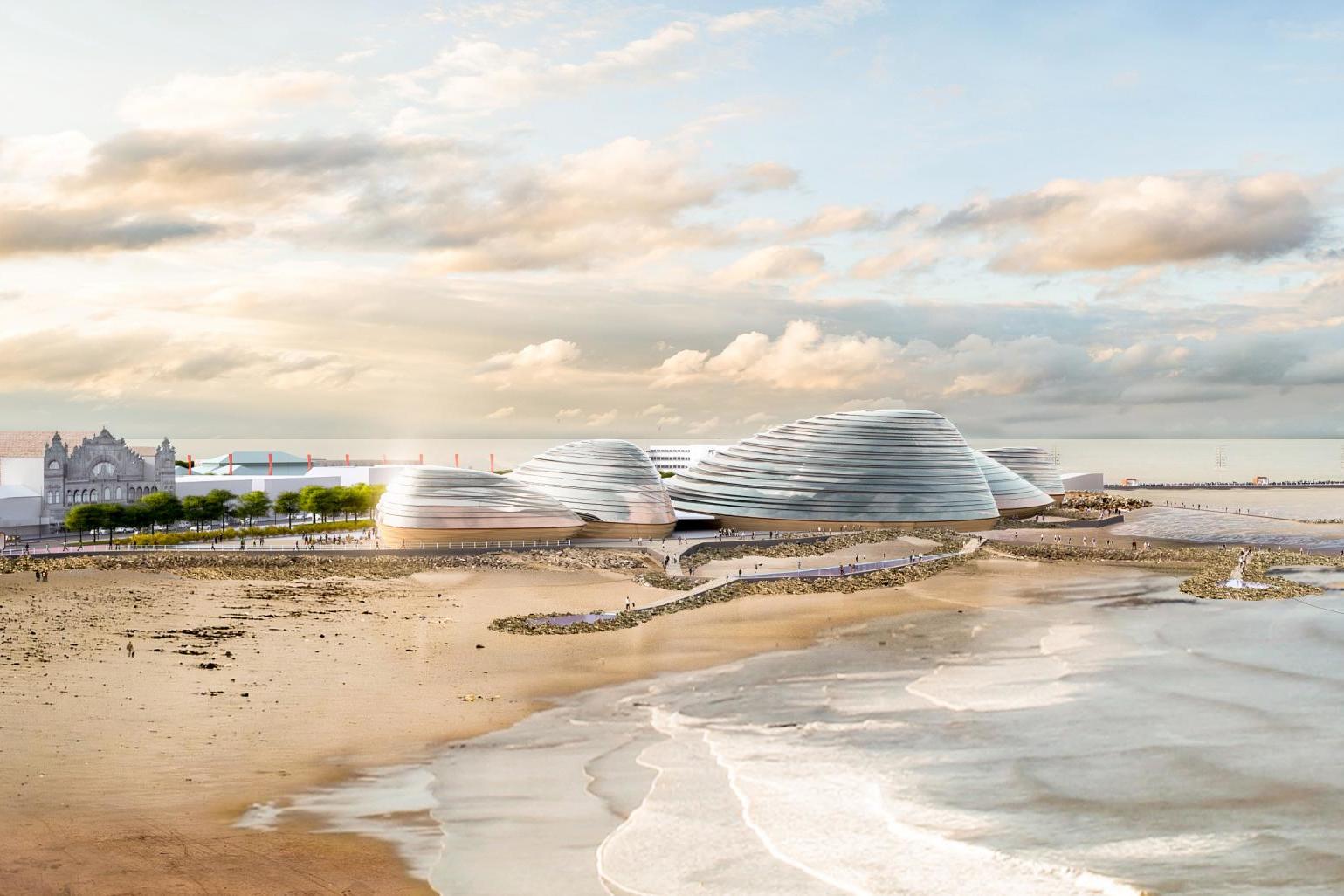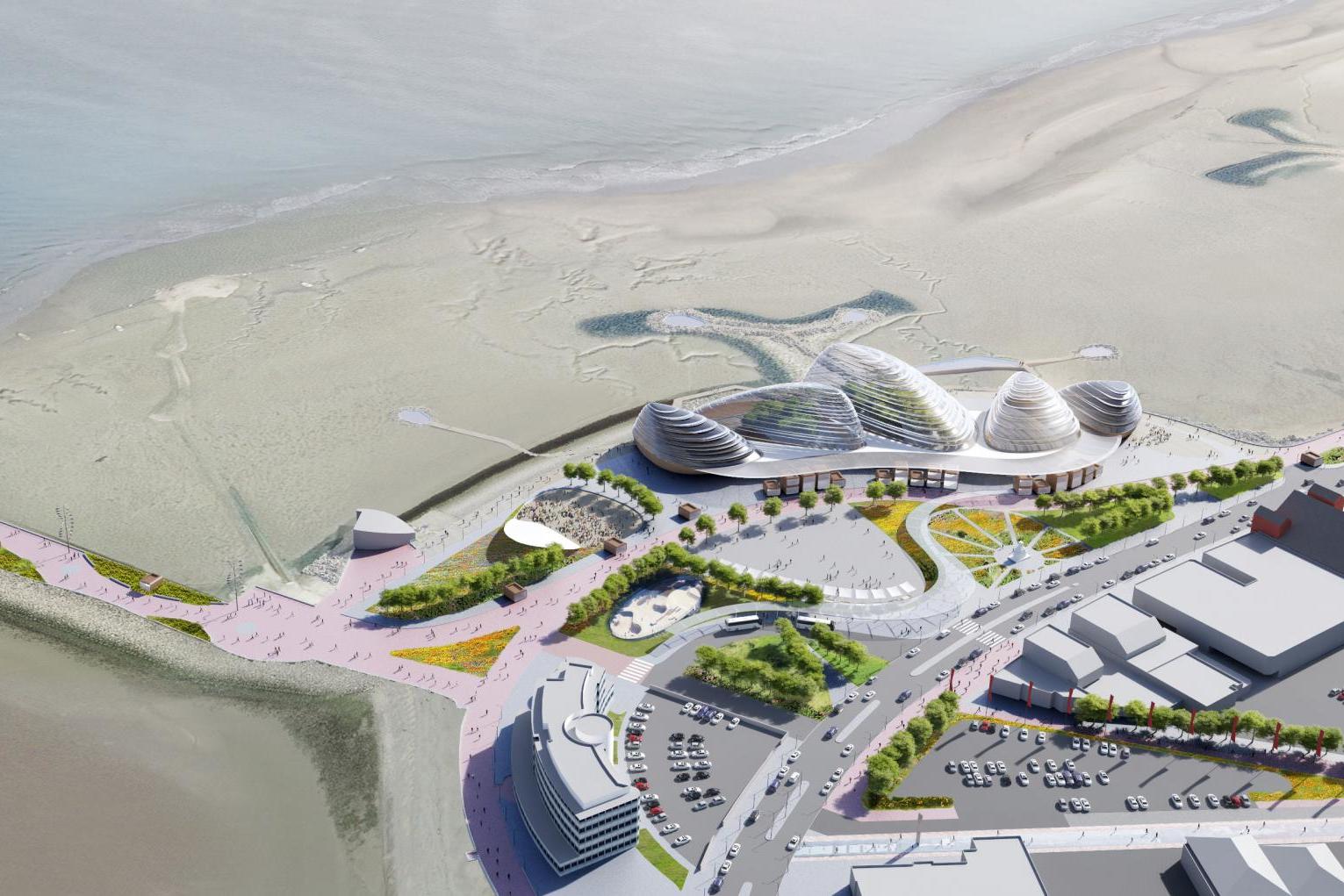Morecambe flexes its mussels: New Eden Project to be shaped like giant shells
Project leader reveals what proposed attraction may look like and feature inside in an exclusive interview with The Independent

It has been called Morecambe’s million-dollar question.
Ever since the Eden Project announced plans to open a version of its Cornwall attraction – famed for its giant biodomes – in the Lancashire seaside resort, one topic has dominated conversation in the town: what exactly will our Eden look like?
Now an answer has been offered: it will look like a giant mussel colony.
Architects have revealed the first artist’s impressions of the multi-million pound Eden Project North – and it features five giant mussel-shaped domes stretching out across the famous bay.
Inside the vast glass buildings will be performance spaces, immersive experiences, observatories and pleasure gardens, all inspired by marine life.
David Harland, chief executive of Eden Project International, told The Independent: “The biodomes in Cornwall are the size and shape they are because we were enclosing a rainforest, but we also wanted to be in newspapers around the world and get people saying, ‘I just have to go and see that building.’ That was the aim and we achieved it. And now we will do the same thing in Morecambe.
“So, we have talked about things like what do you find on the beach there? You find mussel colonies and, funnily enough, when you want a structure that has the ability to house gardens and attractions and to give people a unique experience, well, the shape of mussel shells would be perfect.”
Attractions within, he said, would introduce visitors to Earth’s various water worlds in the same way Eden Cornwall – which boats a 16,000 square metre rainforest – introduced people to the planet’s plants and trees.

“There, the focus is on plants and humans and their interdependence,” he said. “So, here, we’ll be doing something similar but in a marine context.
“The first priority is getting people to connect with the bay outside the front door but that will then allow us to tell the story of what goes on in other places around the world and give portals through to those places.”
He said the emphasis would be on visitor interaction and described a possible attraction where people could walk through a single magnified drop of water to experience how much invisible life teems within: “We don’t want this to be passive or a standard museum – we are in the business of giving people experiences they would not get elsewhere.”
The autumn announcement that an Eden was to be built in Morecambe – if funds could be raised – brought much excitement to the town, with MP David Morris hailing it as a “game-changer”.
The announcement followed a year of behind-the-scenes work after Lancaster University first approached Eden Project International and sold it the idea of opening its second UK venue in the town. They said Morecambe – a once thriving seaside destination now widely perceived to have fallen on hard times – was in need of the same regeneration which the Eden Project Cornwall had brought to that region since opening in a disused clay pit in 2001. They pointed out that the town’s bay – famed for the speed with which the tide comes in – was an area of special scientific interest which would suit enviro-tourism.
“We get a lot of approaches from different places across the world,” said Mr Harland, who says Eden Project International is investigating other possible venues in China, South America and New Zealand. “But this one spoke to us and to what we are about.”
It will be located on the town’s old Stone Jetty, and will be roughly the same size as the inside of the Cornwall Eden Project – “but this is a town centre development so we won’t have the same outside space,” said Mr Harland.
It is hoped the venue would attract between 500,000 and a million people every year – although the concern, to some extent, would actually be keeping demand down.
“We know if we do something fantastic, we won’t have too many problems getting the numbers because of the location – close to the Lake District, as well as Manchester, Liverpool and various other attractions,” said Mr Harland. “What we feel we would actually be looking at is a way of ticketing the attraction – in a similar way to Harry Potter World – to manage demand.”
If the funding could be secured – which would come from a mixture of government and private cash – it is hoped building work could start by 2019 with a potential 2022 opening date. The sticking point on such huge projects, however, can often be local opinion.
So far, claims Mr Harland, that has been overwhelmingly positive.

“You know how news works,” he said. “We announce we’re doing this thing, then the local TV goes out and finds two people in favour and one against, and in Morecambe, they were struggling with that. Across the board we’re getting support because… I think people can see the potential it has for the town.”
Issues such as pressure on local transport links and infrastructure would be smoothed out as part of the development, he said. “Those are the things that people worry about – and rightly, because let’s not kid ourselves, people will be impacted. What we say is the impact will be offset by the social and economic benefits which this will bring.”
Certainly, the benefits have been felt in Cornwall. It has attracted 19 million visitors and pumped an estimated £2bn into the local economy since opening 17 years ago.
“We would love to do that for Lancashire,” said Mr Harland. “The history of Morecambe is that this was a place where, traditionally, people went to escape, take the air and seek a version of the exotic. That’s all we’ll be doing now – trying to bring back the exotic.”
Join our commenting forum
Join thought-provoking conversations, follow other Independent readers and see their replies
Comments
Bookmark popover
Removed from bookmarks